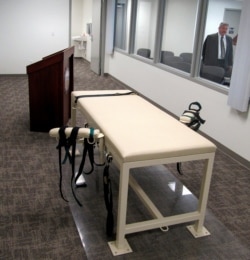When convicted murderer Orlando Hall was executed at a federal prison complex in Indiana on Nov. 19, it marked the first time in more than a century that a federal execution was carried out in the remaining months of an outgoing U.S. president’s term following an election.
But this will not be the only execution during the final weeks of President Donald Trump's term. Five other federal inmates condemned to death, including the only woman currently on the federal death row, are scheduled to be executed over the next two months. The last is slated to take place just five days before Trump leaves office on January 20.
The last post-election federal execution took place in 1889 during the final months of Grover Cleveland’s first presidency, according to the Death Penalty Information Center. Traditionally, outgoing presidents have left final pending decisions on executions to their successors.
If all five planned executions proceed, a total of 13 federal prisoners will have been executed by lethal injection between July 2020 and January 2021, concluding shortly before President-elect Joe Biden is inaugurated on January 20. The 10 federal executions in 2020 are more than any previous year in the 20th or 21st centuries, according to the Death Penalty Information Center.
Most executions in the United States take place at the state level. Last year alone, there were 22 state executions, compared with three federal executions in the previous 34 years.
On Friday, the Justice Department announced plans for three executions, highlighting the shockingly brutal nature of the murders committed by those scheduled to die.
They include Alfred Bourgeois, who abused and beat to death his 21/2-year-old daughter in 2002; Cory Johnson, a former member of a Richmond, Virginia, gang convicted of murdering seven people in 1992; and Dustin John Higgs, who was sentenced to death for kidnapping and murdering three women in 1996.
The scheduled executions are part of a wave that began in July, when the Justice Department resumed capital punishment after a 17-year hiatus. They come as public support for the death penalty has slipped to historically low levels and as an increasing number of states have abandoned the practice.
But both President Trump and Attorney General William Barr are staunch advocates of capital punishment, and death penalty opponents say the Justice Department is rushing the executions before Biden gets in their way.
“If they could live past Trump getting out of office and Biden coming in, they will live,” said Helen Prejean, a Roman Catholic sister and longtime advocate for the abolition of the death penalty.
The U.S. is the only Western democracy that still uses capital punishment. Like most Democrats, Biden was once a death penalty advocate. But during the 2020 presidential campaign, he joined the other Democratic candidates in pledging to end it.
“Biden will work to pass legislation to eliminate the death penalty at the federal level, and incentivize states to follow the federal government’s example,” according to his website. “These individuals should instead serve life sentences without probation or parole.”
But with Republicans favored to continue to control the Senate following two special elections in Georgia, enacting legislation to ban the death penalty will be a long shot, according to experts.
As a result, Biden will most likely simply reinstate the moratorium on the federal death penalty that was in place for most of the past two decades, said Arthur Ago, director of the criminal justice project at the Lawyers’ Committee for Civil Rights Under Law.
Ending federal executions is part of Biden’s larger criminal justice reform package, which includes expanded use of the presidential power of clemency.
“There is a focus on rehabilitation for people that have been convicted of crimes,” Ago said.
Federal executions were halted in 2003 amid question over the constitutionality of the government’s lethal injection protocol.
When Barr announced last year that he was lifting the moratorium with the adoption of a new protocol, he said the death penalty was reserved for “the worst criminals.”
“The Justice Department upholds the rule of law, and we owe it to the victims and their families to carry forward the sentence imposed by our justice system,” Barr said in a statement.
But not all victims’ families supported the executions that followed.
In July, Daniel Lewis Lee became the first federal inmate to be executed in 17 years. But the family of his two victims — Nancy Mueller and her 8-year-old daughter — had long opposed Lee’s execution and unsuccessfully sought to have it delayed until after the COVID-19 pandemic.
Now, amid a new surge in COVID-19 cases across the country, rights advocates worry that the upcoming executions, all planned to take place at the same federal complex in Indiana and certain to draw demonstrators for and against capital punishment, could turn into super-spreader events.
“This is absolutely unconscionable to schedule five executions not only during a pandemic but at a time when Indiana, the county where the prison is located in Vigo County, Indiana, and the nation is facing unprecedented dangers from COVID-19,” said Cassandra Stubbs, director of the Capital Punishment Project at the American Civil Liberties Union.
In July and August, the federal government brought hundreds of people to the Indiana prison complex to participate in five executions, according to documents obtained by the American Civil Liberties Union under the Freedom of Information Act. Stubbs said this likely led to a major outbreak of COVID-19, the disease caused by the coronavirus, at the facility.
“They bring hundreds of guards across the facility, guards who are in contact with thousands of prisoners,” Stubbs said.
The Justice Department and the Bureau of Prisons did not respond to a request for comment.
The five prisoners awaiting execution include Lisa Montgomery, the only woman on the federal death row. In 2007, Montgomery was convicted of strangling a pregnant woman, cutting open her body and kidnapping the baby. Montgomery’s attorneys say she endured extreme sexual violence and trauma and deserves clemency.
“No other woman has been executed for a similar crime, because most prosecutors have recognized that it is inevitably the product of trauma and mental illness,” Sandra Babcock, one of her lawyers, said in a statement.
Montgomery’s execution, initially planned for December 8, was delayed until January 12 after her attorneys contracted the virus and a judge postponed it. She would be the first woman executed under federal law in 67 years.
Two days later, on January 14, Johnson would be put to death. And on January 15, Higgs would be executed.
Despite falling public support for capital punishment in general, most Americans still favor the death penalty for a person convicted of murder.
Jeremy Mull, the prosecuting attorney for Clark County, Indiana, and a death penalty proponent, said the upcoming federal execution cases “fall within the definition of the worst of the worst.”
“All of these cases seem to be cases where justice would require the forfeiture of the life of the murderer,” Mull said in an interview.
But Johnson’s attorneys maintain that he is intellectually disabled and has been a model prisoner while Higgs’ lawyers say he “deserves clemency (in part) because of the unfair sentencing disparity in the case,” noting that Higgs’ co-conspirator, who pulled the trigger, received life without parole.
“In the 20 years he has been incarcerated, Mr. Higgs has adjusted exceptionally well to life in prison and has long been a model inmate,” Shawn Nolan, one of Higgs’ attorneys, said in a statement. “His demonstrated record of positive adjustment makes him particularly well-suited to peacefully live out the remainder of his life in custody.”






